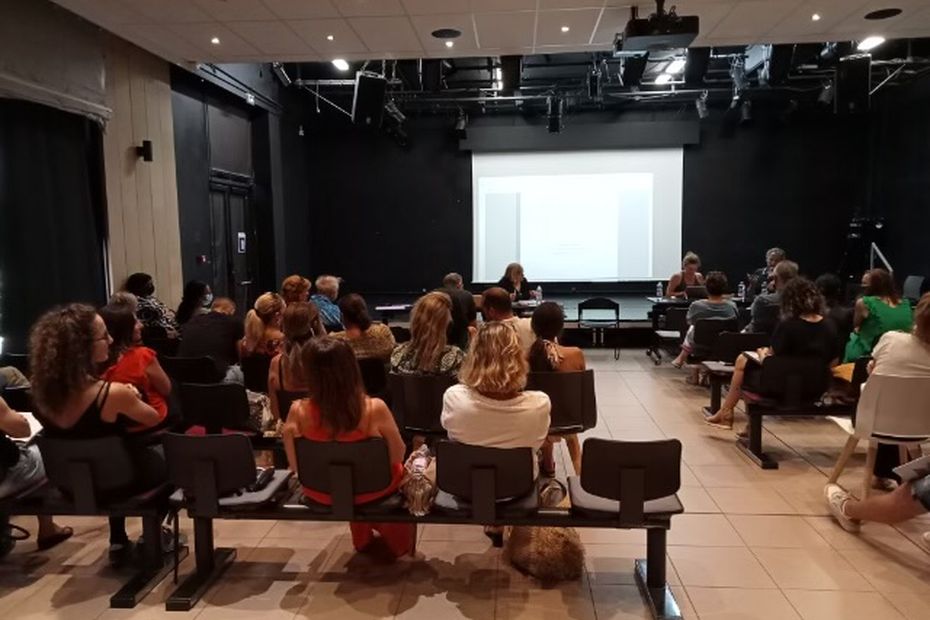On July 7, the Federation of Secular Associations and Continuing Education held its general meeting in Ajaccio. The opportunity for the structure specializing in social action and popular education to formalize the merger between Pumonte and Cismonte.
Established in Ajaccio since 1957, the Federation of Secular Associations and Continuing Education offers educational, cultural and recreational activities with the aim of social and professional reintegration.
“FALEP is affiliated to the League of Education, says Jean-Michel Simon, general manager of the association for ten years and employee for forty years. It has two main activities: popular education (culture, education, sport, schooling, etc.) and social action. It employs 120 employees – animators, specialized educators, general service agents, trainers – and also manages several reception sites for people in difficulty..”
Acted in December 2021, the merger between FALEP 2A and that of 2B was formalized before the press last Thursday in Ajaccio. After the presentation, Jean-Michel Simon gave an interview to France 3 Corse.
France 3 Corse ViaStella: The FALEP of Corsica now forms a single entity. What will this change for the association you lead?
Jean Michel Simon: On the island, there was a large “popular education” service in Bastia. In Ajaccio, on the other hand, it was very small and consisted of one person. So the merger was born a little bit out of that. Initially, we want to rebalance the activity of popular education in order to be able to have a global activity on the whole of Corsica.
Regarding social action, it was more concentrated in Ajaccio with social establishments (Foyers MECS,
For what reasons ?
Before, we had the municipalities, the general councils and the Community of Corsica as partners. From now on, financial support and project presentations are made at the regional level. For FALEP, it is therefore a merger that is both organizational and strategic. This should allow us to grow in the years to come, not in a hegemonic way since we are not a company, but in order to think of other actions in favor of people.
During the General Assembly, the new Board of Directors was elected. The 2021 balance sheet was also presented. Is it positive?
The new board of directors wants to be equal between Haute-Corse and Corse-du-Sud. As for the balance sheet, it appears that the association is doing well overall. I remind you that it is governed by the 1901 law: if it makes profits, they must be reinvested. Our vocation is to be in balance. If our financial health is rather good, it nevertheless remains fragile because we are 100% dependent on public funding. We have no customers. The value of an association is its employees and its activity.
Like many structures, FALEP had to deal with the pandemic and the various confinements. Were you able to continue to follow up?
Since we have establishments that are open 24 hours a day, 365 days a year, we had to cope. We had no choice. We actually continued to work. During the confinements, we set up telework and we also experienced a period of technical unemployment, in particular for the “street educators” who could therefore no longer work. However, this did not have too much impact because we continued to have direct contact with young people, especially via the Internet. Overall, we continued to work. The educational home, and the accommodation and social reintegration center were to be opened. The follow-up of the families was certainly carried out remotely but we were still able to ensure it. We couldn’t afford to stop.
The association has been established in Corsica, in Ajaccio, for more than 60 years. The accompaniment of people in difficulty has had to evolve a lot in six decades. Today, almost a fifth of the island’s population lives below the poverty line. How has the structure adapted over time?
We manage social establishments which take in more and more people in difficulty and who are destructured. They must be taken care of. We also had to deal with a drop in funding. Without going into political considerations, the public authorities, while supporting us, are asking us to provide more support to these populations when there is less and less money.
Like the medical staff, we are faced with an ever-increasing influx of socially abandoned “sick people”, whose care and support require greater skills and funding. Social costs money. Not sufficiently anticipating the consequences of non-treatment or discounted care will lead, in the near future, to uncontrolled and exorbitant expenses.
Hence the fact of wanting to make “users actors”?
Exactly. This remains difficult because the people we care for have also accumulated social handicaps. They are more and more distant from work, from care structures, from their own rights too because they forget them. It is therefore necessary to put in place a policy and then choose actors and operators who will help the population on a daily basis.
In Corsica, are there enough structures to support people in social distress?
We often tend to say that more people are needed to support people who need it more and more. I’ll take an example: before, a person stayed in a shelter for six months. Today, it can happen that some spend two years there. These people must absolutely be accompanied. But for that, we have to recruit and we have a hard time doing it. The profession no longer interests many people. This surely requires a salary increase.
Recently, the Social Conference initiated by the Community of Corsica met twice. Did FALEP take part?
No. During the meetings of this Social Conference, we talk more about societal phenomena than about social itself. Participants talk more about purchasing power or inflation. At FALEP, the people we take care of can no longer do it. They “struggle” at all levels, accumulate difficulties. These are things that we don’t talk about at the Social Conference, which remains mainly centered on social assistance, whereas our work consists of developing individuals on their own, sometimes outside of traditional learning frameworks. This is called “social work”.
Do you think you should have attended?
I think yes. Not only FALEP but also other structures specialized in social work. But above all, I think that we must together define a social policy for Corsica with innovations adapted to our territory and not necessarily apply sometimes obsolete devices from elsewhere.
The list of your partners, including the main towns and intermunicipalities of the island, testifies to an important territorial network. Nevertheless, are there micro-regions, particularly in rural areas, where FALEP is less present?
In rural areas, the method of approach is completely different. It’s more complicated. When an educator intervenes at Salines in Ajaccio, we know that he will meet young people. But when he arrives in certain villages, he sees no one. It is therefore necessary to have gateways: this can be the college, other institutions, town halls. Some micro-regions, like that of Ghisonaccia, are a bit neglected. There, I think there are things to do. Conversely, in Porto-Vecchio, there was an awareness. We now have teams permanently in town.
In the future, what would be the axes to be developed?
The priority project is the development of popular education throughout the territory. We must think of actions to support education and training. It is also necessary to train facilitators and social workers in mobility but also on holidays for young people and their families.
–


